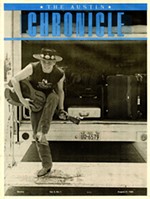Sen. Carona Sees End of the Road ... Money
Are taxes the only solution to Texas' transportation problems? One Republican thinks so.
By Lee Nichols, Fri., April 2, 2010
Last week, along the shores of Town Lake, Capitol birdwatchers spotted an extremely rare and endangered species – a Republican willing to come out in favor of raising taxes.
The odd duck in question was Sen. John Carona of Dallas, at the Four Seasons Hotel to deliver the keynote address of the Austin Chamber of Commerce's first-ever State of Transportation event. He made a dire prediction about Texas' transportation future (money for new projects is about to run out), offered an easy way to fix it (raise the motor-fuels tax), and said the Republican governor he supports will be the main obstacle to doing so.
"By 2012, funds for new transportation in this state will largely go away," said Carona. "We are headed toward the edge of a cliff in transportation funding in the state of Texas. ... What money we have in will cover ... what we already have on the ground, nothing more than that – just maintaining what we have."
In the next 25 to 30 years, the state population is expected to double, said Carona, which means Texas will need new roads, rail, and other projects to move those people around. He cited reports from two different commissions – one from the Texas Department of Transportation's 2030 Committee and another from the Governor's Business Council – claiming that Texas could have a shortfall in funding of either $50 billion or $150 billion.
Carona said the crisis has been a long time coming – since 1991, specifically, the last time the fuels tax was increased. That tax has been stuck at 20 cents per gallon since then. "Now imagine if the Post Office had tried to operate on the same postage rate per postage stamp it had back in 1991," Carona said. "The fact of the matter is, it would be out of business. But that's what we've asked TxDOT to do." To make it worse, he said, that 20 cents now has only 14 cents of the purchasing power it had in 1991.
Carona said the tax should be raised at least a dime a gallon and indexed to inflation, with the money used to leverage more financing. The big obstacle, of course: Politicians don't want a tax increase on their voting records. But, Carona said, "If you don't have the political courage from time to time to raise it, it becomes obsolete." The most important of those politicians – assuming he's reelected – is Gov. Rick Perry. As a presumed alternative, Perry has embraced the building of privately developed and maintained toll roads.
Getting around that roadblock "depends on you," Carona told the assembled business leaders. He said he supports Perry, but Perry simply isn't going to raise taxes, so, "You've got to become so loud, so public on this issue, that people in the Capitol are simply unable to turn down the volume" – part of "what The Dallas Morning News called a 'transportation crusade.'"
Carona took on critics who say this funding crisis is "hype." These critics, said Carona, claim the money could be found if diversions were stopped, inefficiencies at TxDOT were eliminated, transparency at TxDOT were increased, money weren't thrown at rail, and all transportation money (taxes, fines, etc.) were put back into roads. "If 100 percent of diversions were eliminated," he said, "it would take care of roughly 10 percent of our need for the next 20 years." What about putting all transportation money back into roads? "Amen to that. ... The problem is, we can't restructure right now the entire state budget. ... Anything you're able to pull back for transportation simply means there's another hole to fill someplace else." Eliminating inefficiencies? "If you went in and eliminated every inefficiency you could find, perhaps you'd find $50 [million] to $100 million." That's only a "drop in the bucket," said Carona.
"The number one tool in the toolbox ought to be a robust and competitive and current motor-fuels tax," Carona said. "That is the least expensive way to build roads in this state. I'll argue that point with anybody that wishes to stand up and argue with me."
Private toll roads, he said, are "exponentially" more expensive, not only in repayment costs, "but the very duration of the agreement itself means long after the road is paid for, those monies that would have otherwise been returned into our transportation system, or would have meant that a toll road no longer is a toll road, go into the hands of a private developer."
"Senator Carona is right on time about the need for more gas tax money," said Bill Spelman, who as an Austin City Council member knows firsthand what it means to grapple with a transportation crisis. "I'm really happy that Carona and the responsible business community and responsible elements of the Republican Party recognize that there is a serious problem here that is going to have an effect on the business community."
Despite serving in the swing House District 47 (Southwest Travis County), Democratic Rep. Valinda Bolton said "ditto" to Carona's remarks even though the GOP might target her on it. "I've surveyed my district about this issue, and there was pretty overwhelming support for it, because I think when people are stuck in traffic and stuck in congestion, it takes money," said Bolton, whose district boundaries include the notoriously traffic-plagued Oak Hill. "Unfortunately, this is one of those problems you can solve by throwing money at it. ... But the reality is, even if the House and the Senate overwhelmingly passed an increase, the governor would proudly veto it."
Carona agreed. "That's the challenge, is that Governor Perry, for political reasons that only he can explain, has chosen a policy of massive toll roads instead of a much simpler and more fiscally responsible solution of an increase in motor-fuels taxes. The only way to get it past Governor Perry is to put it inside a constitutional resolution. Constitutional resolutions, which require two-thirds votes in both chambers, cannot be vetoed by the governor."
Got something to say on the subject? Send a letter to the editor.











